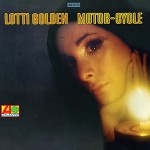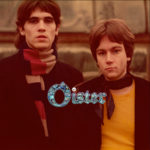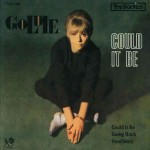-
Featured News
Patti Smith Upcoming Tour for 50th Anniversary of Horses
 By Harvey Kubernik
“Horses was like the first cannon blast in a war – frightening and disorienting. I mean, she was so unlike the FM radio terrain in every way. She was literate, aggress
By Harvey Kubernik
“Horses was like the first cannon blast in a war – frightening and disorienting. I mean, she was so unlike the FM radio terrain in every way. She was literate, aggress -
Featured Articles
Chasing the White Light: Lou Reed, the Telepathic Secretary and Metal Machine Music
 By David Holzer
Fifty years ago, Lou Reed released Transformer. In among “Walk on the Wild Side,” “Make Up” and “Vicious,” cuts that would launch a cartoon Rock N Roll Animal pers
By David Holzer
Fifty years ago, Lou Reed released Transformer. In among “Walk on the Wild Side,” “Make Up” and “Vicious,” cuts that would launch a cartoon Rock N Roll Animal pers -
Lotti Golden’s Motor-Cycle Reissued by High Moon Records

By Harvey Kubernik
I remember in late 1969 when an acquaintance of mine, Heather Harris, an editor at the UCLA Daily Bruin Entertainment pages, received a copy of the Bob Crewe-produced Lotti Golden debut LP Motor-Cycle on Atlantic Records.
Harris, and another concert pal of mine, Nancy Rose Retchin at Palisades High School, were big fans of Laura Nyro, and both knew I liked female singers and poets.
In winter of 1969 I first heard Golden’s Motor-Cycle on KPPC-FM in Pasadena, California, and got my own copy of the album at Wallichs Music City in Hollywood. I had read reviews of her in Newsweek and The New York Times when I stocked shelves in the library at West Los Angeles Junior College in Culver City.
Golden’s stream of consciousness lyrics was influenced by the beat generation and Jack Kerouac. Motor-Cycle wasn’t Brill Building pop music, but songs about narcotics, gender identity, the ramifications of involvement, and urban alienation from a Thrill Building tunesmith who was the landlord doing the reporting.
In 1968 and ’69, Heather, Nancy and I went monthly to the Shrine Exposition Hall in downtown Los Angeles for the Pinnacle Dance Concerts. Three former USC students, Sepp Donahower, Mark Chase and John Van Hamersveld, promoted 13 shows of visiting acts and local bands. It was where art, film and music collided. Filmmaker George Lucas was on the Single Wing Turquoise Bird lightshow crew. We saw Moby Grape, Canned Heat, Buffalo Springfield, Jefferson Airplane, Vanilla Fudge, Pogo (pre-Poco), Lee Michaels, Mothers of Invention, Richie Havens, and Sweetwater.
OISTER – 1973-74 (Hozac) 2-LP

Heaven-sent for fans of classic ‘70s pop, this is the first ever release by the legendary Tulsa outfit comprising Dwight Twilley and Phil Seymour who would soon thereafter become the great Dwight Twilley band. The Twilley band were a unique hybrid of harmonic Anglophile pop/rock and rockabilly who released two brilliant albums on Shelter—one very polished, one much earthier—before the two principals went solo. Oister was the same but different. The differences may come down to recording technique or simply the youth of our heroes.
There is a charming fragility and innocence here not found in the later Twilley or Seymour stuff. And a dreaminess: indeed much of this is the embodiment of the term ‘dream pop’ and should appeal to a whole host of people who find the concept of power pop anathema. And the current crop of Big Star fans. The lo-fi aspect will also appeal to fans of DIY. There’s a little bit of the baroque but for the most part it’s spirited, minimalist early Beatles/Hollies-style pop rock, with a rootsiness learned from early mentor and former Sun artist Ray Harris, and the frequent prominence of Twilley’s piano lets you know it’s the ‘70s. Most of the songs here were later rerecorded for official release, including the sublime “You Were So Warm,” but even a lot of the re-recordings have only appeared on Twilley rarities collections, and the versions are strikingly different. The material is uniformly strong; the never-before-released “Pop Bottle” is a stunner.
Thank god for the current power pop revival and Hozac for this release: hopefully it will lead to a wider appreciation of Dwight and Phil and all their recordings. Now can someone put it out on CD for me please? (David Laing)
GOLDIE – Could It Be (Top Sounds) 7”

At the end of 1965, Goldie—a.k.a. Genya Ravan—found herself solo in the England, her Gingerbreads having returned to home to America without her. So in January 1966 she recorded, “Could It Be,” a lovely slice of big production blue-eyed soul written by Denny Cordell and Jamaican singer Tony Washington, “Could It Be.” The track was not released at the time, but has now been salvaged from an Emidisc acetate and etched into heavy seven-inch vinyl by the Top Sounds label for your listening pleasure.
Andrew Loog Oldham signed her to a management deal around the same time, and produced what was to be her debut solo release, a sublime version of a newly-minted Goffin-King number, “Goin’ Back,” arranged and conducted by Art Greenslade. The single was issued on Immediate in February with the Oldham-scribed B-side “Headlines,” a brassy soul number with cinemascope lyrics later recorded at a much faster tempo by Chris Farlowe. Unbeknownst to Oldham and Goldie, though, Dusty Springfield also had plans to record “Goin’ Back,” and when she got wind of Goldie’s version, she threw a fit. In the subsequent tempest in a teapot—detailed in the liner notes—Oldham agreed to withdraw the release, clearing a path for Dusty to take the song into the UK Top 10 that summer.
“Goin’ Back” and “Headlines” make up the flipside of this excellent three-song EP, which comes in a classy full-color sleeve with a booklet insert. (Mike Stax)